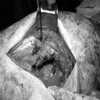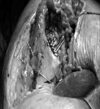Abstract
Purpose
To evaluate clinicoradiological outcomes after cementless bipoloar hemiarthroplasty in elderly patients with femoral intertrochanteric fractures.
Materials and Methods
From March 2006 to February 2008, 28 patients-all in patients greater than 80 years of age, classified unstable intertrochanteric fractures in Evans classification-were followed for more than 1 year. 24 patients were women and 4 patients were men. The mean age of the patients was 84.6 years, the mean follow-up period was 16.3 months. Harris hip score, postoperative inguinal and thigh pain, Parker and Palmer mobility score were analyzed clinically. The radiological results were assessed using various radiological indicies including bone-union, fit and alignment change of femoral stem and vertical subsidence.
Results
The average Harris hip score was 82.9, Parker and Palmer mobility score preoperative 8.0 changed to 5.2 postoperatively. More than moderate pain was presented in 1 case. There were no cases of varus deformity or osteolysis. All stems were stable without significant alignment change or subsidence except 1 case of periprosthetic fracture. There were no dislocation, thromboembolism, death during operation or hospital days.
Figures and Tables
References
1. Berend KR, Lombardi AV, Mallory TH, Dodds KL, Adams JB. Cementless double-tapered total hip arthroplasty in patients 75 years of age and older. J Arthroplasty. 2004. 19:288–295.

2. Boldin C, Seibert FJ, Fankhauser F, Peicha G, Grechenig W, Szyszkowitz R. The proximal femoral nail (PFN)-a minimal invasive treatment of unstable proximal femoral fractures: a prospective study of 55 patients with a follow-up of 15 months. Acta Orthop Scand. 2003. 74:53–58.

3. Crowninshield RD. Design considerations to reduce stress shielding. Total Hip: Cement vs. Cementless. Harris Hip Course. 1984.
4. Dandy DJ. Fat embolism following prosthetic replacement of the femoral head. Injury. 1971. 3:85–88.

5. Engh CA, Bobyn JD. Engh CA, Bobyn JD, editors. Clinical evaluation of biological fixation. Biological fixation in total hip arthroplasty. 1985. Thorofare, NJ: Slack Inc;219–240.
6. Evans EM. The treatment of trochanteric fractures of the femur. J Bone Joint Surg Br. 1949. 31B:190–203.

7. Haentjens P, Casteleyn PP, De Boeck H, Handelberg F, Opdecam P. Treatment of unstable intertrochanteric and subtrochanteric fractures in elderly patients. Primary bipolar arthroplasty compared with internal fixation. J Bone Joint Surg Am. 1989. 71:1214–1255.

8. Haidukewych GJ, Berry DJ. Hip arthroplasty for salvage of failed treatment of intertrochanteric hip fractures. J Bone Joint Surg Am. 2003. 85-A:899–904.

9. Harris WH. Traumatic arthritis of the hip after dislocation and acetabular fracture:. treatment by mold arthroplasty. An end-result study using a new method of result evaluation. J Bone Joint Surg Am. 1969. 51:737–755.

10. Huiskes R, Chao EY. A survey of finite element analysis in orthopedic biomechanics: the first decade. J Biomech. 1983. 16:385–409.

11. Hungerford DS, Jones LC. The rationale for cementless total hip replacement. Orthop Clin North Am. 1993. 24:617–626.

12. Hwang DS, Jung HT, Kim SB, SB JS. Recovery of walking ability after operation for unstable intertrochanteric fractures in of the Femur in Elderly. -Timing on weight Bearing-. J Korean Soc Fract. 1998. 11:296–303.

13. Kang JS, Dorr LD, Wan Z. The effect of diaphyseal biologic fixation on clinical results and fixation of the APR-II stem. J Arthroplasty. 2000. 15:730–735.

14. Khan RJK, MacDowell A, Crossman P, et al. Cemented or uncemented hemiarthroplasty for displaced intracapsular femoral neck fractures. Int Orthop. 2002. 26:229–232.

15. Kim YH. Bilateral cemented and cementless total hip arthroplasty. J Arthroplasty. 2002. 17:434–440.

16. Lettich T, Tierney MG, Parvizi J, Sharkey PF, Rothman RH. Primary total hip arthroplasty with an uncemented femoral component: tow- to seven-year results. J Arthroplasty. 2007. 22:7 Suppl 3. 43–46.

17. McAuley JP, Moore KD, Culpepper WJ 2nd, Engh CA. Total hip arthroplasty with porous-coated prostheses fixed without cement in patients who are sixty-five years of age or older. J Bone Joint Surg Am. 1998. 80:1648–1655.

18. Parker MJ, Palmer CR. A new mobility score for predicting mortality after hip fracture. J Bone Joint Surg Br. 1993. 75:797–798.

19. Parvizi J, Holiday AD, Ereth MH, Lewallen DG. The frank stinchfield award. Sudden death during primary hip arthroplasty. Clin Orthop Relat Res. 1999. 369:39–48.
20. Rothman RH, Cohn JC. Cemented versus cementless total hip arthroplasty. A critical review. Clin Orthop Relat Res. 1990. 254:153.




 PDF
PDF ePub
ePub Citation
Citation Print
Print






 XML Download
XML Download